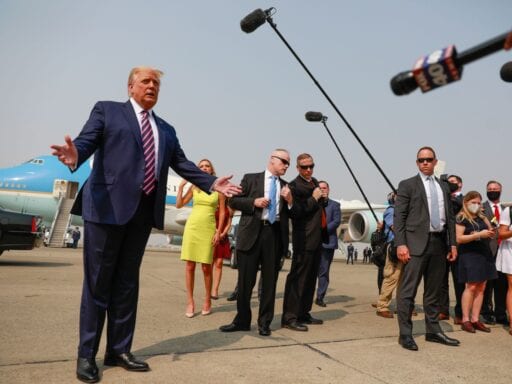Trump in an April 10 tweet: “The Invisible Enemy is in full retreat!” Trump three days later: “This thing is a killer.”
Newly released audio of a conversation President Donald Trump had with Washington Post journalist Bob Woodward on April 13 reveals more starkly than ever how Trump misled the American public about the threat posed by Covid-19, the disease caused by the novel coronavirus.
Trump told Woodward that “this thing is a killer if it gets you. If you’re the wrong person, you don’t have a chance.”
“So this rips you apart,” Trump added. “It is the plague.”
CNN broadcast the audio on Monday. Listen:
In a newly released tape, Trump privately tells Bob Woodward in April that COVID-19 “is a killer if it gets you.” pic.twitter.com/Jiib9GJqwz
— TPM Livewire (@TPMLiveWire) September 15, 2020
Covid-19 is estimated to have a 3 percent observed case-fatality rate in the US, making it far deadlier than the flu, which kills people in about 0.1 percent of cases. (The rate was likely even higher back in April, while the US was struggling to ramp up coronavirus testing and develop effective treatments.) And as the president alluded to, Covid-19 is especially deadly for people with comorbidities, such as heart disease or diabetes.
But while Trump leveled with Woodward, he said very different things publicly. On April 10 — three days before the aforementioned conversation — Trump tweeted, “The Invisible Enemy will soon be in full retreat!”
The Invisible Enemy will soon be in full retreat!
— Donald J. Trump (@realDonaldTrump) April 10, 2020
Four days after his conversation with Woodward, Trump posted his infamous string of tweets urging people to “LIBERATE” Minnesota, Michigan, and Virginia — states with Democratic governors who had imposed public health measures to slow the spread of Covid — despite the fact he clearly understood the deadliness of the pandemic.
Trump said one thing privately, and another thing publicly. As a result, people who listened to him might not have taken the necessary precautions to avoid exposure to a virus that has now killed more than 194,000 Americans and counting. Now, he continues to flout public safety recommendations, holding political rallies that double as potential superspreader events, at which Trump has been undercounting the number of deaths.
Trump is having a hard time explaining the Woodward tapes
Since the Washington Post starting publishing audio clips of Trump’s conversations with Woodward last week, Trump has downplayed evidence he misled the public about Covid-19 by saying he was simply trying to keep people “calm” and avoid inciting a “panic.”
Those talking points are absurd: Trump’s entire reelection campaign is premised on whipping up hysteria about the dangers he says are presented by Democratic presidential nominee Joe Biden and his party’s agenda. But even if it were true that Trump was just trying to project calm, there are ways to do so that don’t involve spreading misinformation aimed at encouraging Americans to underestimate a deadly virus in a way that could put them at risk.
So why did Trump mislead people? There are only speculative answers to that question, but one thing we know for sure is that short-term thinking has been central to Trump’s coronavirus response from the very beginning last winter, when he reacted to the first US cases by implausibly and incorrectly claiming that the virus would go away on its own “like a miracle.”
Trump wanted to keep the stock market stock market strong, because he viewed doing so as important to his reelection chances. But at the same time, he seemingly wanted to signal to Woodward that despite what he was publicly saying, he was savvy to what really was going on with coronavirus.
But in another illustration of his short-term thinking, Trump apparently never considered that audio of his conversations with Woodward could be published before the election and serve as a reminder of his coronavirus failures. And now that it has, the president has resorting to attacking the messenger with personal insults while trying to spin the recordings in an implausible way.
Help keep Vox free for all
Millions turn to Vox each month to understand what’s happening in the news, from the coronavirus crisis to a racial reckoning to what is, quite possibly, the most consequential presidential election of our lifetimes. Our mission has never been more vital than it is in this moment: to empower you through understanding. But our distinctive brand of explanatory journalism takes resources. Even when the economy and the news advertising market recovers, your support will be a critical part of sustaining our resource-intensive work. If you have already contributed, thank you. If you haven’t, please consider helping everyone make sense of an increasingly chaotic world: Contribute today from as little as $3.
Author: Aaron Rupar
Read More



